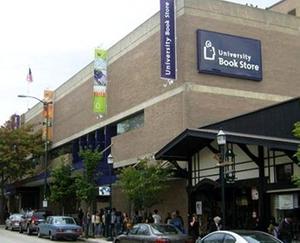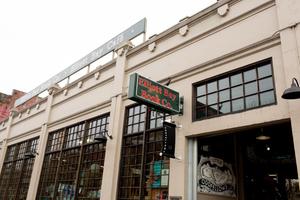Shelf Awareness continues a multi-part series on how booksellers are reacting to a range of laws boosting the minimum wage that have been enacted in various states and municipalities around the country. Last week and this week, we examined how booksellers in California, Washington, D.C., and New York are dealing with new state and local wage requirements. Today, in our last installment of this series, we talk with booksellers in Seattle, Wash.
In Seattle, the current minimum wage for employees who are not receiving benefits at companies with fewer than 500 employees is $12 per hour. For employees at companies with fewer than 500 employees who are receiving benefits, the wage is $10.50 per hour. For the former group, the wage will reach $15 per hour by January 1, 2019, while the latter will arrive at that level by January 1, 2021. Once employers reach $15 per hour, the wage will increase each year by a percentage pegged to the Consumer Price Index.
 At University Book Store, which has three locations within Seattle proper and four in surrounding municipalities, payroll costs have increased by nearly 6% in the last fiscal year. According to Pam Cady, manager of the general book department, and Lara Konick, chief of retail operations, this is the result not only of raising wages at the bottom of the pay scale but also of raising wages for those who were already "ahead of the curve." Employees at UBS locations outside the city are being paid commensurate to those in the Seattle.
At University Book Store, which has three locations within Seattle proper and four in surrounding municipalities, payroll costs have increased by nearly 6% in the last fiscal year. According to Pam Cady, manager of the general book department, and Lara Konick, chief of retail operations, this is the result not only of raising wages at the bottom of the pay scale but also of raising wages for those who were already "ahead of the curve." Employees at UBS locations outside the city are being paid commensurate to those in the Seattle.
"The cities surrounding us are looking at Seattle and will probably be heading in that direction soon," said Cady. Tracking pay location by location would be more complicated than it's worth, she added, and asking employees outside of Seattle to be paid less for the same amount of work simply wouldn't be fair.
Konick, meanwhile, said she was very concerned about the effects that wage compression might have on staff. Wages are being forced up from the bottom by minimum wage increases, she explained, but given books' extremely thin margins, there is effectively a ceiling. As a result, wages are being compressed toward the middle. For example, by next January, she noted, a starting cashier will make $13 per hour, which is what some people who have been working at UBS for five or six years are currently earning. Said Konick: "There becomes less and less incentive for anyone to stay for a long period of time."
Cady and Konick hope to avoid layoffs, and are looking for ways to work more efficiently and effectively, as well as to leverage things the store is already doing without significantly increasing payroll. For example, UBS already does a small amount of business-to-business sales. Although growing that area would take time and effort, it could have a potentially high sales impact with a low payroll consequences. A new inventory management system is also in the works.
Konick also noted that removing prices from books might work to the disadvantage of bookstores. She explained: "If there were no prices on books, the perceived value would be whatever the lowest price [customers] could find is."
"On a day-to-day basis, we're figuring it out so far," said Cady. "People are not leaving. There have been challenges for years."
 In the first six months of 2016, sales at Seattle's Elliott Bay Book Company have risen more than 10%. Peter Aaron, the owner of the store, cautioned that there is no way to know if there's a causative relationship between the sales increase and the minimum wage increase or if it's simply a coincidence, but he emphasized that so far, he has seen no negative financial consequences of the higher minimum wage.
In the first six months of 2016, sales at Seattle's Elliott Bay Book Company have risen more than 10%. Peter Aaron, the owner of the store, cautioned that there is no way to know if there's a causative relationship between the sales increase and the minimum wage increase or if it's simply a coincidence, but he emphasized that so far, he has seen no negative financial consequences of the higher minimum wage.
In order to maintain "fairness and proportionality" between those who have been at the store for a long time and those who are just walking in the door, Elliott Bay has raised employee pay "up and down the line," Aaron said. The costs associated with these increases are not insignificant, but the store is taking it one year at a time.
One possible negative consequence that the store has seen--though Aaron also stressed that a causative relationship with the wage increase can't be shown--is that it has lately been difficult to hire new staff. Aaron suggested that this may be a result of Seattle's strong economy.
"It's a cyclical thing," Aaron said. "There are times when the overall economy is not doing that well and all kinds of people are looking to work for the kinds of wages that a bookstore can afford to pay. And there are times when things are booming and it's hard to hire people."
While Aaron said he hoped that publishers might unveil programs that help bookstore profitability, he was strongly against the idea of removing prices from books. With book pricing, he said, there is only pressure from the bottom. Publisher-set prices maintain some order. Without them, he said, it's "just chaos."
On the whole, Aaron was extremely supportive of raising the minimum wage. "Based on my experience it looks like a win-win. I think it's a great thing." --Alex Mutter

